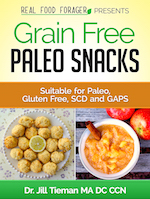Osteoporosis is a disease of thinning bones that puts people at risk for bone fracture. In the elderly, a fractured hip or other extremity can be the end of self sufficiency or worse. Now that we have drugs to treat osteoporosis, it is on the radar for treatment. Prior to bisphosphonates, doctors never addressed the problem. However, with any treatment there are risks that need to be considered.
Why not take a bone building drug?
The quick and easy answer to osteoporosis is to take the pill recommended by your physician. But will that actually help? The answer is probably not. In a lecture given by Dr. Cate Shannahan (author of Deep Nutrition) at the Paleo Summit last week, she revealed a very disturbing fact.
Risk of osteonecrosis
For starters, the risks of serious side effects are pretty high. In 1 – 2% of the population taking a biphosphonate by infusion (due to cancer therapies that thin the bones), there is the incidence of a condition called osteonecrosis — death of the bone. If you get this condition in the jaw, the main treatment is to have the jaw bone removed. Would you want to take a drug that may cause you to have your jaw removed?
Compared to the 1 – 2% chance of this drug preventing a fracture — it’s a no brainer.
Risk of spontaneous fracture
People who have been taking the pill form of these drugs (Boniva and Fosamax) run the risk of spontaneous fractures. That means that they can be walking along and suddenly with hardly any warning, the thigh bone can snap. Just like that.
With this potential side effect, the current recommendation is to get off these drugs after four to five years.
Not to mention the severe esophageal burning that can occur with oral forms of bisphosphonates.
The dynamic of bone building
The other question is, do these drugs really work? The answer needs a little background information about the way bone is built.
Bone is not static. It is a dynamic storehouse of minerals for the body. When the body (blood) needs calcium or any other mineral, it takes it from the bone. When calcium is plentiful in the blood, it puts it back into the bone for storage.
There is also a continuous breakdown of old bone and build up of new bone. It is a constant dynamic of bone breakdown and bone building.
The special cells in the bone that accomplish this are osteoblasts and osteoclasts. The osteoclasts reabsorb the old, worn out sections of bone that need to be replaced. The osteoblasts come in to replace and build brand new bone. The drugs block the bone reabsorbing cells (osteoclasts).
So, if the drugs block the bone reabsorbing cells, what happens to the old worn out bone cells? According to Dr. Shannahan, they just sit there in the bone matrix, where they should no longer be.
Bone density tests are not reliable after taking bisphosphonates
What are the implications of this? Well, drug therapy is based on bone density tests. If you have a bone density test (they recommend all women over 50 to have a baseline and you will need to take another test after two years to make an assessment), and if it shows that you have osteopenia (the beginning of osteoporosis) or frank osteoporosis, the drugs are recommended.
If you are on these drugs for a couple of years, the old bone stays put because the bone reabsorbing cells are blocked. Consequently the scan or x-ray looks dense. Based on the denser looking bone on the scan, the interpretation is that the bone density has improved due to the drug.
However, the old bone is weak. Dr. Shannahan gives the example of an x-ray of a piece of chalk. That will look very dense on an x-ray. But, it can be snapped very easily so it is not at all strong.
The conclusion I draw from this (and this really shocked me) is that the bone density testing is worthless after taking a bone building drug for a few years, because it shows a false bone density that is not strong. This is an imaging test, not a functional test.
There are many people out there taking these drugs and having these tests with the expectation of stronger bones. That is clearly false.
Calcium Supplementation
Calcium, upwards of 1500 mgs a day is recommended for post menopausal women. This includes what you would get from food, but supplements are also recommended by both medical doctors and nutritionists.
The problem is, calcium absorption can be compromised for many reasons. The first place it can be compromised is in the stomach.
Hydrochloric acid (HCl) is needed as part of the first step, in the stomach, for cleaving calcium. Many people have decreased HCl production for several reasons:
- As we age, HCl is decreased.
- Many people are taking antacids either over the counter or by prescription and this will decrease HCl.
- The low salt diets recommended by the USDA decreases HCl as salt is where the Cl portion comes from.
If you are taking calcium as an isolated supplement it is probably not getting absorbed — or if it is, it is only 10%.
Minerals need the whole complex of nutrients to be adequately absorbed, especially the fat soluble mineral activators, vitamins A, D and K2. You must have these fat soluble activators to absorb calcium and other minerals.
If we are not absorbing the calcium where does it go?
Here’s the problem. It doesn’t go into the bones if it not being properly absorbed. The calcium will float around in the blood and gets deposited in troublesome places:
- As calcified atherosclerotic plaques
- In the tendons and joints as bone spurs
- As calcium oxalate kidney stones
Calcium supplements found to increase risk of myocardial infarction
In a study published in the British Medical Journal in July 2010, researchers at the University of Auckland conducted a meta-analysis of calcium supplement studies. They found that calcium supplements (without coadministered vitamin D) are associated with an increased risk of myocardial infarction.
This is a good example of how isolated supplements may actually be dangerous.
The solution to osteoporosis
Food sources that contain minerals and the fat soluble vitamins A, D and K2 are the best way to ensure strong bones. There are elements within these whole foods that orchestrate the appropriate use of the minerals and ensure that they are absorbed.
Foods to ensure strong bones
- Bone broths made from the bones of grassfed animals (chicken or beef) that have been simmered overnight or longer will provide minerals that are easy to absorb. Many cultures that did not eat dairy, always had a small portion of bone broth with their meals.
- Fish with the bones, such as canned salmon with the bones and sardines
- Cod liver oil provides the fat soluble mineral activators A and D. If it is paired with high vitamin butter oil you will also get the activator K2.
- Grassfed butter also provides vitamin K2 as well as some A and D.
- Organ meats like liver from grassfed animals provides vitamins A and D.
- Lard from pastured pigs provides a huge amount of vitamin D.
- Raw milk from pastured cows provides highly absorbable minerals and nutrients.
- While green leafy vegetable have some minerals, it must be eaten with butter because butter will provide the fat soluble mineral activators that will help absorption of the minerals.
- Nuts also provide some minerals, but they must be properly prepared by soaking in salt and then dehydrating to remove enzyme inhibitors like phytic acid.
Other factors that contribute to bone health
- Weight bearing exercise is very important for building density in the bones.
- Vitamin D supplementation if your 25-hydroxy vitamin D levels are low
- Magnesium supplementation in a 1:2 ratio, magnesium to calcium (some nutritionists advise 1:1 ratio)
Rather than spending tons of health care dollars on flawed bone density testing, and throwing money down the toilet on isolated supplements, let’s educate people about making dietary changes and appropriate supplementation
to help this condition.
Stay tuned for my next post about how gluten affects bone density.
What are you doing for your bones? Leave a comment and let me know!
Where to buy high quality cold liver oil
Where to buy high quality supplements












